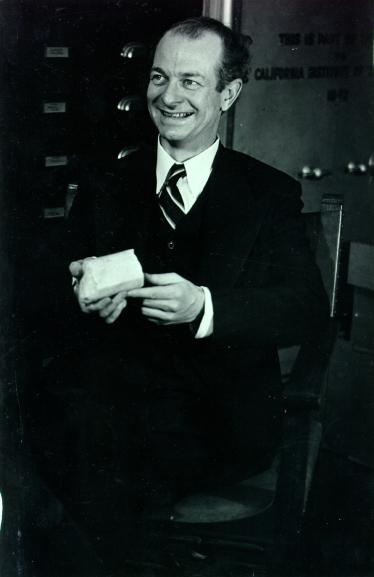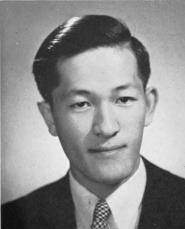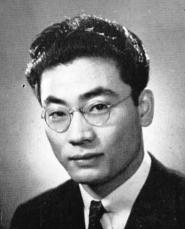
Linus Pauling, 1942
[Ed Note: Parts 5 and 6 of our series detailing Linus Pauling’s work on the serological properties of simple substances both focus on the intriguing life stories of three individuals with whom Pauling worked on this program of research.]
Over the years, Linus Pauling forged close relationships with many of his graduate and doctoral students, offering guidance that, in numerous cases, changed the course of a student’s career. During World War II, he fought particularly hard for two of his research assistants, Miyoshi Ikawa and Carol Ikeda. In both cases, Pauling’s intervention prevented these colleagues from being forcibly interned. Instead, Ikawa and Ikeda each moved on to graduate studies and fruitful careers in science.
Miyoshi “Mike” Ikawa was born in California in 1919 to first generation immigrant parents. He pursued undergraduate studies at Caltech, where he was a member of the Chemistry Club and Tau Beta Pi, and competed on the Fleming House wrestling team. When he graduated in 1941, he was already working in Pauling’s lab, preparing compounds and helping with the first three serological papers. Pauling subsequently served as his graduate advisor.
Carol Ikeda came to Caltech from Texas in 1939, having started his education at Paris Junior College in Texas. He transferred to Caltech with the intent to study chemistry and become an organic chemist. At Caltech, he stood out among many other very bright students; Pauling described him as “one of the top men in the class.” Not one to give compliments lightly, Pauling recognized Ikeda’s potential not only from his performance in class, but also from his work in organic research labs on campus. Before Ikeda had even decided to continue onto graduate studies at Caltech, Pauling had recruited him for the serological project as an assistant in the Immunochemistry department. Indeed, it is especially noteworthy that Ikeda and Ikawa both are listed as co-authors for Pauling’s first three serological papers, given that the first two papers were published while Ikeda and Ikawa were still undergraduates.
Up until World War II, it appeared that Ikawa and Ikeda were each moving well down the path toward successful careers in immunology, organic chemistry, or biochemistry. This all changed when President Franklin Roosevelt issued Executive Order 9066 and declared Pasadena to be a military zone.
Even before the attack on Pearl Harbor, U.S. citizens of Japanese descent faced discrimination on the basis of race as well as suspicions that they would prove more loyal to Japan than to the United States even if they were second- or third-generation citizens. Acutely aware of the mounting tension faced by American-born Japanese, Pauling was determined to support students bearing this burden and to make sure that they could find positions at Caltech for which they were suitably qualified.
Pauling was likewise clear in his understanding that other universities did not share his point of view. In the recommendations that he wrote, he provided full disclosure and acknowledged potential discomforts regarding race, an issue that many administrators would have preferred be left unacknowledged. In one particular reply to a request for recommendations, Pauling wrote
…the two best men scholastically in our graduating class are American born Japanese, Ikawa, and Ikeda. Although one of them has, I think, a satisfactory personality for teaching work, I doubt that you would be interested in appointing him because of his racial handicap.
Some universities responded positively to recommendations of this sort; the University of Iowa, for one, confirmed that race wouldn’t be a problem at all. Rather, Pauling’s Iowa contact assured that the institution shared Pauling’s stance and was committed to considering the qualifications of their applicants regardless of race. The reply went on to state,
While we have not had any American-born Japanese on our teaching staff, I see no reason why they would not get along satisfactorily, if they have the necessary intelligence and ability.

Miyoshi Ikawa, 1941
Ikawa and Ikeda had been working on the serological project for more than a year when Pasadena was declared a military zone. Cognizant of the need to help his assistants relocate to a safer area, Pauling had a relatively easy time finding Ikawa a position as a graduate student at the University of Wisconsin, where he worked under Karl Paul Link. This move ultimately changed the course of Ikawa’s career. Before receiving his doctorate, Ikawa, along with Link and Mark A. Stahmann, synthesized warfarin and obtained a patent for it to be used as a rat poison. By 1950, warfarin (now commonly referred to as Coumadin) was being used to treat blood-clotting disorders such as thrombosis, because it was a strong anticoagulant. It still serves this purpose today.
With the war over, Ikawa was free to return to the West Coast, where he conducted postdoctoral research at Caltech and UC-Berkeley, before moving on to the University of Texas. In the early 1960s, he settled down and became a professor at the University of New Hampshire, where he began focusing on marine biotoxins. In 1972, he and his colleagues established the Paralytic Shellfish Monitoring Program for the state of Maine, a course of action that followed the first evidence of a red tide in the southern Gulf of Maine. Ikawa taught at the University of New Hampshire for twenty years and then spent most of his later career advising technical panels and partaking in peer review committees for federal research grants. He passed away in 2006.

Carol Ikeda, 1941
Pauling had a harder time finding a position for Ikeda. In February 1942, shortly after Roosevelt released his executive order, Pauling sent a letter to Robert Millikan – the chairman of the Caltech Executive Council – about Ikeda’s progress and position. In this, Pauling tried to make the case that, while his serological research wasn’t directly related to defense work, its results could be valuable for their medical application. He also pointed out that finding someone as competent as Ikeda to continue these studies would be nearly impossible.
As it turned out, this approach backfired for Pauling, because so many people were nervous about having American-born Japanese involved in any war effort. Consequently, Millikan asked Pauling to vouch for Ikeda’s loyalty in order to allow Ikeda to continue “to undertake, under special arrangement, research work which may involve defense matters.” Pauling vouched for Ikeda’s work, but hesitated to comment on his loyalty, because he felt that someone with a more personal working relationship with Ikeda could give a better answer. He also suggested that Ikeda could be transferred to a teaching position if the issue of loyalty could not be resolved to Millikan’s satisfaction.
As Millikan deliberated, Pauling began to feel that Caltech might not be the best environment for Ikeda, even if he was transferred to a teaching position. In short order, Pauling contacted Michael Heidelberger, a faculty member at Columbia University’s College of Physicians and Surgeons. In doing so, Pauling offered Heidelberger a quid pro quo of sorts, suggesting that Heidelberger accept Ikeda into his program at Columbia in exchange for Pauling hosting one of Heidelberger’s researchers in Pasadena. This plan broke down when the Columbia researcher that Pauling had in mind wrote back to say that he could not accept an appointment at Caltech and that he wished to stay on at Columbia instead.
The situation was not improved much by Heidelberger’s blasé attitude toward the internment camps. Recognizing that “wholly” patriotic people would be unjustly punished, Heidelberger remained unconvinced that there was much that he or Pauling could do to alleviate the issue, an opinion shared by many. As would later become the norm, Pauling stood out here as a lonely voice in the scientific community.
For Ikeda, things worked out at the last minute. In April 1942, just two weeks before Ikeda was assigned to report to a camp, Pauling managed to find him a graduate position at the University of Nebraska, where he completed his Ph.D. in 1945. In 1947, Ikeda accepted an offer of employment from DuPont in Delaware, and then later moved within the company to Philadelphia. In 1962, he received a patent for a resinous coating material that he developed while working for DuPont. He passed away in Phoenix, Arizona in 1996, having enjoyed a successful life and career.
Advertisements